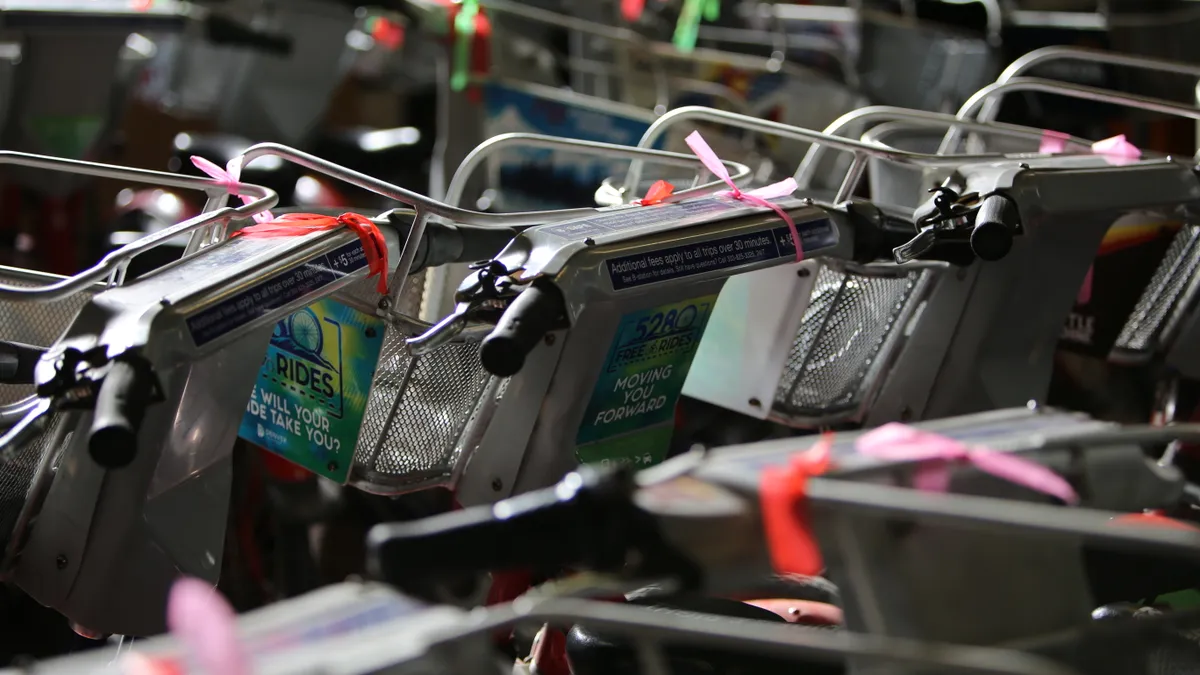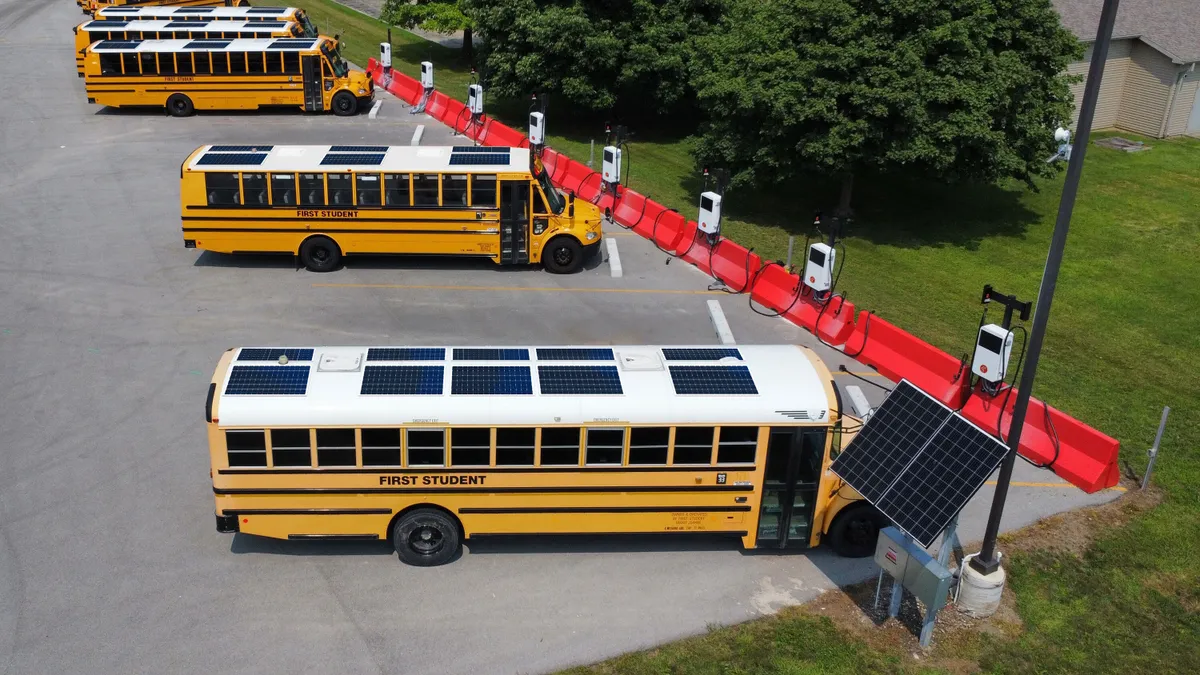Bicycle advocates across the nation expressed anger and disappointment last month when videos and photos depicting thousands of JUMP e-bikes at a scrap recycling facility circulated.
Former JUMP operator Uber — which moved operations under Lime in an investment deal just before this incident — cited "maintenance, liability, safety concerns" and other issues for its decision to scrap the bikes, instead of donating them to those affected by the current national bike shortage. Yet not everyone is sold on this response, including the team at Houston Bike Share.
In early 2020, nonprofit Houston Bike Share, operator of Houston BCycle, was presented an opportunity to purchase used bikes from nonprofit Denver Bike Sharing amid that city's shuttering of its BCycle program. The deal not only saved more than 100 bikes and 45 docking stations from the scrapyard, but gave the nonprofit an affordable opportunity to expand its bicycle network, particularly into underserved communities.
"To remove, scrap or dispose of such a large quantity of equipment is a bit hurtful to see, because it's clear that could be used somewhere else to create opportunities or access, through the lens of micromobility, for someone that needs it," Doogie Roux, director of operations at Houston Bike Share, told Smart Cities Dive of the JUMP decision.
"I was struck by how wasteful it seemed," echoed Thomas Epling, shop manager at Houston Bike Share. "To be demolishing the bikes just seemed incredibly narrow-sighted. They could have been donated to local organizations. Obviously there's a great need — we see that a lot here in Houston, especially right now."
But how did Houston and Denver avoid such maintenance and safety concerns cited by Uber? According to officials from both city bike nonprofits, it boiled down to clear communications, creative refurbishing and a strong understanding of how these bikes can be utilized.
"We weren't naive," Epling said.
Denver's trash, Houston's treasure
For 10 years, Denver Bike Sharing worked with BCycle as its vendor to run the city's bike sharing program. In late 2019, Denver Bike Sharing decided it would end its BCycle partnership due to an "aging system" (docked bikes) and to the program being "no longer financially viable." The program ended on Jan. 30.
Scrapping its fleet of pedal bikes and docking stations was never an option for Denver Bike Sharing, operations manager Keegan Castor told Smart Cities Dive. "Our whole goal as an organization doesn't really align with that," he said.
Instead, Denver Bike Sharing first turned to donations, the biggest of which was to Northeast Transportation Connections (NETC), an organization that runs local bike libraries for people in need. The nonprofit then turned to selling the bikes to other BCycle systems, including in Boulder, CO, Los Angeles and Houston.
At that time, Houston Bike Share had been in the middle of a "very time-consuming and expensive" process to expand its docked bike system through grant funding and donations. When the news of Denver BCycle's shutdown reached Houston, that team saw it as an opportunity to save significantly, while developing a connection with another biking community.
"It was really a no brainer for us. Typically, a new bike from BCycle would cost somewhere around $1,200," said Epling. "We worked out a deal for $100 per bike, which is a huge discount for us."
An additional $55-per-bike was spent on new parts to repair or replace minor issues across the fleet and protect rider safety — many of the bikes were on the older side of 5-7 years — yet even with repairs, the cost savings were enormous. (A quick calculation found Houston Bike Share saved upwards of $130,000 through this deal).
"Denver was extensively using them a lot, but they did a great job at maintaining their fleet," Epling said. Out of 130 pedal bikes purchased, he said only three or four had a flat (which was "pretty remarkable") and most repairs were done to replace proprietary parts so the bikes could be refurbished at a traditional bike shop.
Houston Bike Share also purchased about 45 docking stations from Denver Bike Sharing through a lump sum offer. "The cost to refurbish or bring those back to life varies widely, but in all, the cost relative to a new station ... is small," Roux said.
Rolling ahead
Harris County, where Houston sits, provided $600,000 for Houston Bike Share to refurbish the overall equipment and redeploy it. While none of these acquired bikes were electric — a factor that may have contributed to Uber's alternative decision for JUMP disposal — Harris County Commissioner Rodney Ellis added $250,000 to Houston Bike Share's funding for the eventual purchase of 100 electric bikes.
That additional purchase will bring Houston Bike Share to more than 1,000 bikes in its fleet, Roux said, marking a "great milestone."
“We're always looking for opportunities to have a bigger footprint and serve more people, not only as far as bike share itself but also just getting more butts on bikes," he said. "It's encouraging to see the demand for bikes, for people wanting to get out on the bikes. Houston has this image of being a car-centric city. It still very much is, but we can see that kind of slowly changing."
Roux said Houston Bike Share is continuing to champion for new bike infrastructure and work with partners to ensure bikes are accessible to "everyone in every community," an effort that will be prioritized when selecting locations to install the acquired docking stations.
For Denver Bike Sharing, letting go of the BCycle fleet and stations presented an opportunity to start fresh. The nonprofit is moving forward with Chicago-based micromobility company VeoRide and submitted a bid to Denver's recent request for qualifications to run the city's shared micromobility services.
The city's shortlist of finalists will likely be issued by the end of the week, procurement specialist Katie Ragland told Smart Cities Dive in an email.




















